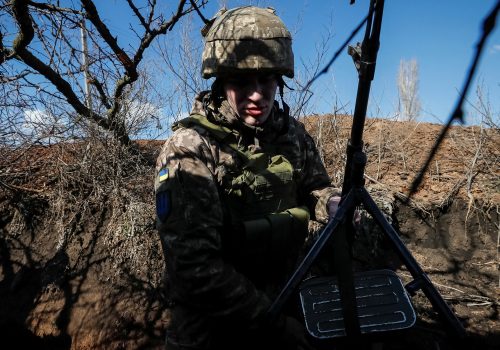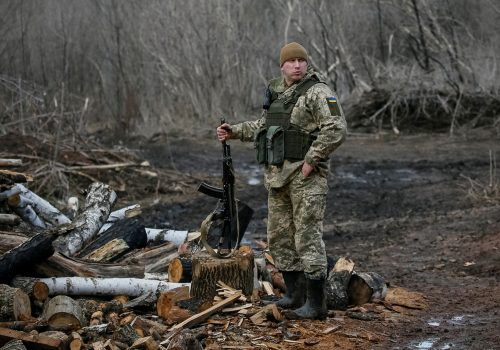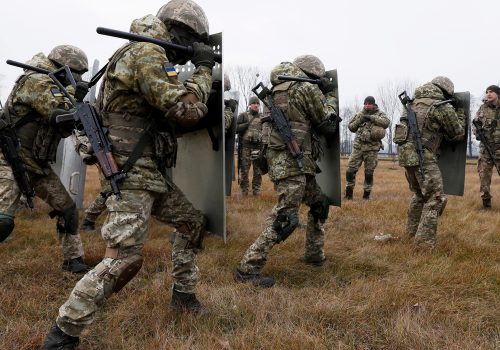FAST THINKING: The West strikes back against Russia’s Ukraine incursion
JUST IN
Call it Nein Stream 2. After sending mixed signals in recent months, the German government on Tuesday swiftly canceled the Nord Stream 2 natural-gas pipeline from Russia to Germany in response to Russian President Vladimir Putin’s deployment of additional Russian troops into eastern Ukraine. Meanwhile, the European Union and the United States retaliated with sanctions against Russian banks and elites. What do these moves signal about transatlantic unity, and will they be enough to deter Vladimir Putin? Our experts’ insights are flowing in.
TODAY’S EXPERT REACTION COURTESY OF
- Daniel Fried (@AmbDanFried): Weiser family distinguished fellow and former US ambassador to Poland.
- John Herbst (@JohnEdHerbst): Senior director of the Eurasia Center and former US ambassador to Ukraine
- Julia Friedlander (@jfriedlanderdc): C. Boyden Gray senior fellow, director of the Economic Statecraft Initiative in the GeoEconomics Center, and former US National Security Council director
How big did Biden go?
- US President Joe Biden announced that US financial institutions will not process payments from state-tied institutions Vnesheconombank and Promsvyazbank, which Dan says “sets a standard for strong future action against most of the big Russian banks.” He also praises new restrictions on trading Russian sovereign debt.
- Biden said the coming days would bring more punitive measures against Russian elites. In all, the package “will deliver a heavy blow to the Russian economy,” John tells us. “This will certainly give the Kremlin provocateur pause before further escalating, especially as Biden said that he has more painful arrows in his quiver.”
- But Julia argues that the Kremlin will have seen this coming. “Moscow will have priced in, if not anticipated, these very moves,” she says, “and the impact on Russian financial markets may not be fireworks.”
Subscribe to Fast Thinking email alerts
Sign up to receive rapid insight in your inbox from Atlantic Council experts on global events as they unfold.

‘Bridge’ collapse
- The Nord Stream 2 pipeline, which would take Russian gas directly to Germany under the Baltic Sea, thus bypassing Ukraine, has long been controversial, as it would increase Russia’s geopolitical leverage in Europe while taking revenue away from Ukraine.
- And yet German politicians, particularly from new Chancellor Olaf Scholz’s Social Democrats and previous Chancellor Angela Merkel’s Christian Democrats, have seen Nord Stream 2 as “a ‘bridge’ to Putin’s Moscow, a stabilizing factor in Russian-European relations, or a purely commercial project that should be insulated from mere politics,” Dan tells us.
- That approach, combined with Germany’s decision to block NATO allies from sending weapons to Ukraine and insist that Moscow wasn’t weaponizing energy, “actually served Kremlin interests,” John notes.
- But “Putin’s aggression against Ukraine and threats to the European security order” forced a change of heart, Dan says: It’s “a blow to Putin’s likely expectation that the West’s response to his aggression would be weak.”
- Dan points out that the Biden administration has been widely criticized for not using its own sanctions to block the pipeline last year, but Tuesday’s announcement “vindicates” that approach. “Rather than burn through a lot of political capital with Germany over Nord Stream 2, the Biden team allowed Germany to make its own call,” Dan tells us. “And it did, the right one.”
Now what?
- While Biden has called Russia’s latest act an “invasion,” the administration is holding back in case Putin contains his military moves to Ukraine’s Donbas region—much of which Russian proxies have controlled since 2014. The US response amounts to “a warning shot,” Dan says. “And worse aggression may be coming.”
- There’s also a big difference between this opening salvo and the Obama administration’s sanctions in 2014, Julia points out: “All [US] legal authorities are firmly in place and further [sanctions] designations are prepared, giving the US greater flexibility in when and how it makes its next move.”
- John notes that Germany’s Nord Stream decision is similarly only an “interim” step, and the German government can restart the certification process for the pipeline in the future. That’s one reason, he argues, for the Biden administration to slap sanctions on the pipeline and halt it once and for all. “But if Putin does not launch those hundreds of thousands of troops into Ukraine,” he adds, “that can wait until after this crisis subsides.”
Further reading
Thu, Feb 24, 2022
LIVE: Russia-Ukraine peace talks, Putin’s nuclear threat, and Germany’s big military bet
New Atlanticist By
As Russia further escalates its military intervention in Ukraine, check back here for the latest insights, analysis, and reporting from the Atlantic Council's experts as events unfold.
Mon, Feb 21, 2022
Russia just ordered troops into Ukraine again. What happens next?
Experts react By
As the fast-moving situation on the ground develops, our experts weigh in on what this moment means for a world that could soon be forever altered.
Thu, Feb 17, 2022
Twenty questions (and expert answers) about what’s happening with Ukraine and Russia
New Atlanticist By
As the crisis in Eastern Europe continues to unfold, we tapped our expert network to answer the burning questions about the implications for Russia, Ukraine, and the wider world.
Image: US President Joe Biden announced on Tuesday a first tranche of sanctions against Russia as he described the start of a Russian invasion of Ukraine and promised more severe measures if Moscow pursued its incursion in the country, without excluding, however, a diplomatic solution. Photo via Reuters/Kevin Lamarque.


